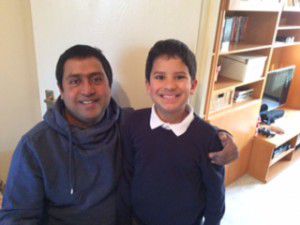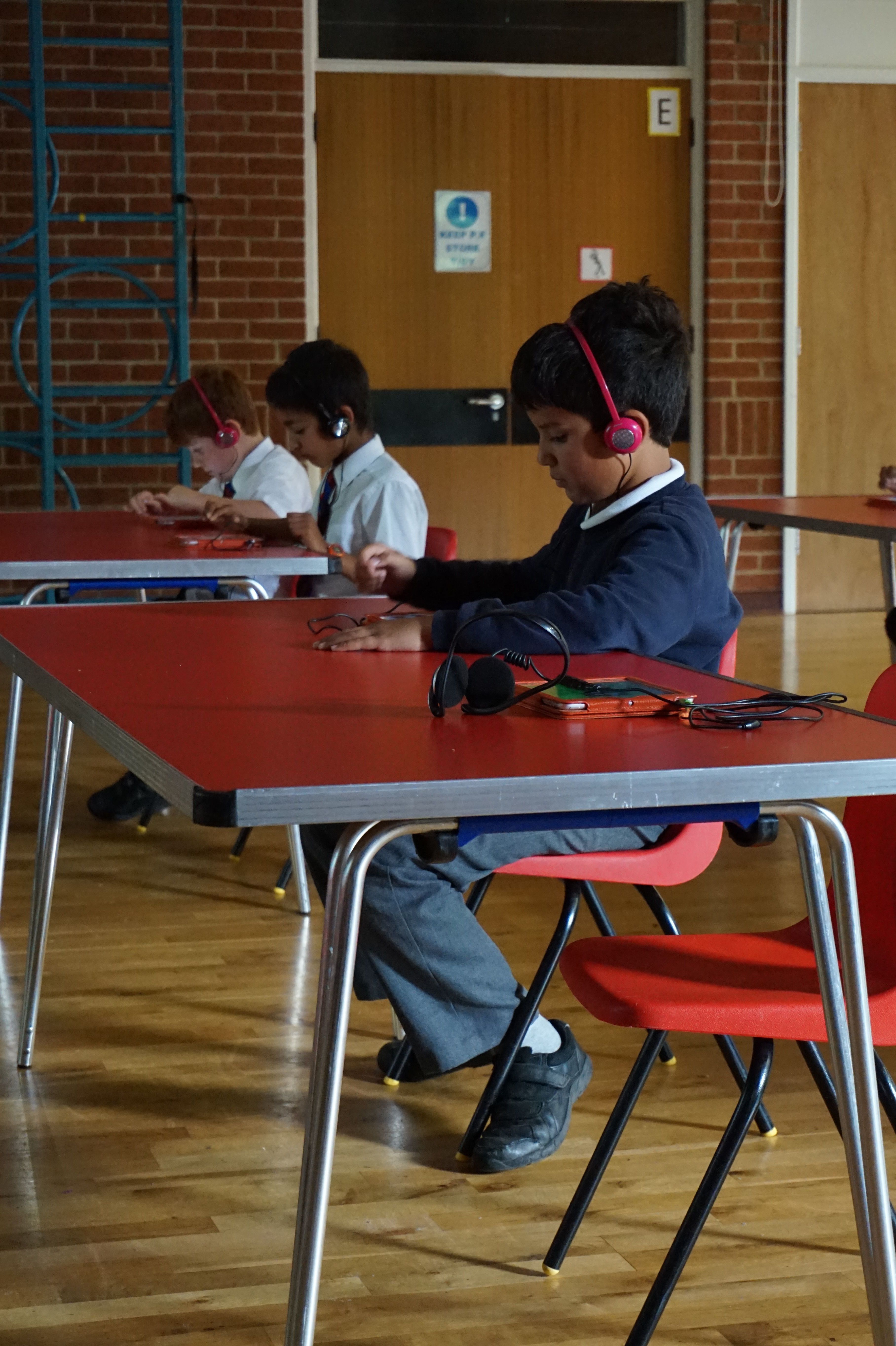Counting the days: Reuben can’t wait for his 4th Junior Language Challenge
In today’s blog post, father and son Joseph and Reuben share with us their JLC story and how learning made fun got them counting the days until this year’s competition.
If you’re a parent or teacher of children aged 10 and under in the UK, visit juniorlanguagechallenge.com to find out more about our annual competition, which opens on Friday 11th March.
Reuben was just 6 and in Year 2 when a teacher with a passion for languages opened the JLC to this year group for the 1st time. Reuben got stuck in to learning Spanish, then Greek, breezed past most of the school including the Y6s and in to the East-Midlands’ semi-final. He came 4th. This was an inspiration to the other children that left them waiting for the next JLC. His success justified an early introduction of Abbey Road children to the exciting challenge of learning a new language. The sheer passion and excitement with which he approached the languages, the colourful child-friendly software and the brain-teasing range of games that increased in difficulty as his competence increased and introduced the language as it might be used in every-day life, kept him glued to learning, so much so that he was at it during every waking moment. For once, we parents did not have to battle with him to get off his game console or the iPad! Most importantly he remains as enthusiastic and motivated several challenges on.
 Reuben waited eagerly for his next shot at the JLC in Year 3. While the 1st round was a doddle for him, he crashed ignominiously out of the semi-final, learning an important life lesson, that there is no substitute for hard work. Rather than letting this get him down, he worked very hard and consistently in Year 4, at gaining a working knowledge of Portuguese, then Mandarin and qualified for the final in London. He was very excited and enthused by his success and immersed himself in learning Arabic for this. The fierce competition did not deter him but rather spurred him on and he came 13th after a hard fought set of heats.
Reuben waited eagerly for his next shot at the JLC in Year 3. While the 1st round was a doddle for him, he crashed ignominiously out of the semi-final, learning an important life lesson, that there is no substitute for hard work. Rather than letting this get him down, he worked very hard and consistently in Year 4, at gaining a working knowledge of Portuguese, then Mandarin and qualified for the final in London. He was very excited and enthused by his success and immersed himself in learning Arabic for this. The fierce competition did not deter him but rather spurred him on and he came 13th after a hard fought set of heats.
Having enjoyed himself so much and coming within a hair-breadth of winning, he continues his JLC journey. He cannot wait for this year’s challenge to begin. He is counting the days!
Joseph Chandy
___
I started the Junior Language Challenge in Year 2 at the age of 6 and have taken the Challenge every year since then. It is an amazing experience that I look forward to.
I love languages and was extremely interested in participating. I loved the way the games were laid out. This makes them really easy to understand and play and most importantly, it makes the whole experience really fun. No matter how hard the language is or may seem, EuroTalk makes it easy to learn and understand.
JLC combines two extremely important things in life, having lots of fun and language learning. It’s definitely not boring; it’s one of the best and most exciting experiences you can have. I love the competition it creates; the urge to win in all competitors is great. One of the things I love about the JLC is how you can share the massive excitement and competitiveness with other people who are also in the challenge. I strained to be at the top of the scoreboard, competing with my friends Adam and Farah Akbar and many others.
 Getting to the semi-final and final is a special feeling I will never forget. The feeling that you’re among the best of the massive amount of participants is simply amazing. The best thing is, the entrance fee is only £5 and it goes to an absolutely wonderful cause, a non-profit organisation called onebillion, whose sole aim and cause is to give the children in Malawi a better education and a much brighter future.
Getting to the semi-final and final is a special feeling I will never forget. The feeling that you’re among the best of the massive amount of participants is simply amazing. The best thing is, the entrance fee is only £5 and it goes to an absolutely wonderful cause, a non-profit organisation called onebillion, whose sole aim and cause is to give the children in Malawi a better education and a much brighter future.
I hope that more people can join the Junior Language Challenge and share this brilliant experience. I love the Junior Language Challenge and I will never forget it. JLC 2016 is a few mere days away!
Reuben Chandy
How much money are you wasting on language software?
So, you’ve decided to learn a language. Great! Now what?
If you’re anything like me, you’ll have gone straight to the Internet in a fit of great enthusiasm, and bought yourself a language course – whether that’s in an app, on a CD or online. You might even have gone a step further and enrolled in a class.
But then the sun comes out, or the World Cup kicks off, or you decide to start reading the Game of Thrones books (only recommended if you have nothing else to do with your time for at least six months), and that passion for your new language starts to fade a little bit. Suddenly there are other things to do with your time, and although you definitely still want to be able to speak the language, you just don’t seem to have the time or enthusiasm to actually learn it.
And so that language course you bought, which promised so much, is forgotten and unused, and your dream of going travelling and fitting in like a local remains just that – a dream.
Can anyone else hear violins…?
It might sound obvious, but the thing about language courses, whether it’s EuroTalk, Rosetta Stone, Duolingo or any of the other multitude of programs out there, is that they’re only as useful as you allow them to be. I wish I could tell you that simply by downloading uTalk to your iPhone, the vocabulary will magically find its way into your brain while you’re sleeping, but it’s just not true (although if you want to try it, it’s available from the App Store).
 Let’s look at this another way. You want to lose weight, so you join a gym. Logical. Maybe you even go along a few times after work. But then six months later you’re still not skinny, and on top of that you’re out of money and you probably feel pretty bad about yourself too. According to research by online accountants Crunch.co.uk, here in Britain we were wasting £37m a year on unused gym memberships in 2011. Just think what we could have been doing with that money. Or how fit we could all have got if we’d kept going to the gym.
Let’s look at this another way. You want to lose weight, so you join a gym. Logical. Maybe you even go along a few times after work. But then six months later you’re still not skinny, and on top of that you’re out of money and you probably feel pretty bad about yourself too. According to research by online accountants Crunch.co.uk, here in Britain we were wasting £37m a year on unused gym memberships in 2011. Just think what we could have been doing with that money. Or how fit we could all have got if we’d kept going to the gym.
The fact is, gyms don’t magically make you fit, or thin. (If it were as easy as that, I’d have joined one a long time ago.) They just provide the conditions you need to get yourself there. Even a personal trainer, whose job it is to help you, will only get so far if you’re not willing to meet them in the middle. And it’s the same with language software – if you don’t use it, it can’t help you. We’d all love a big red button that will get us instantly to where we want to be, but life isn’t like that.
And that’s not necessarily a bad thing. Learning a language isn’t just about being able to speak that language. It’s also about the things you’ll discover along the way. You’ll learn to appreciate your own native tongue, understand the culture of the language you’re learning; you might even make a whole new group of friends. And personally, I think the satisfaction you feel the very first time you manage to speak to someone in another language, even if it’s just to say hello or thank you, is much greater than the pleasure you gain from becoming fluent. In the same way, reaching your target weight will feel amazing – but nothing will beat that first pound you lose.
So my advice is this – don’t buy language software, unless you’re going to use it. Because as the late Maya Angelou once said, ‘Nothing will work unless you do.’ And we don’t want your language app gathering virtual dust on your iPhone, until one day you realise you don’t need it any more and quietly delete it.
But if you do decide to invest in a course (hopefully EuroTalk!), and you follow through on that crazy plan you had one day to learn Russian, or Korean, or even Klingon, that’s great. I guarantee you won’t regret it – and it’ll definitely be less painful than going to the gym.
Liz
